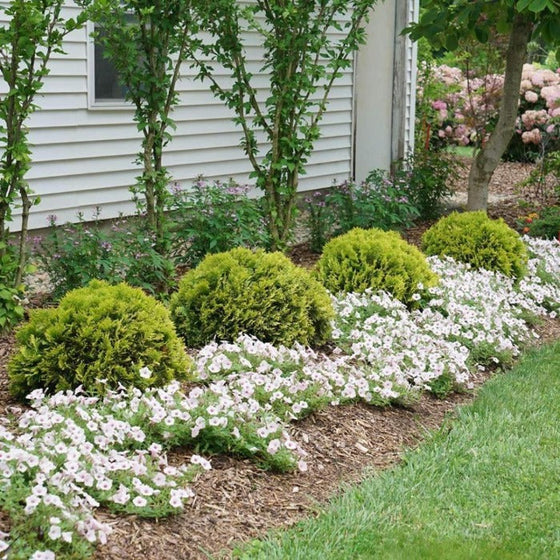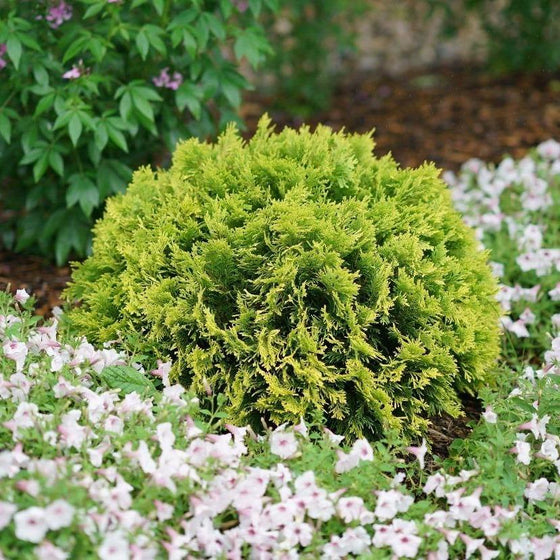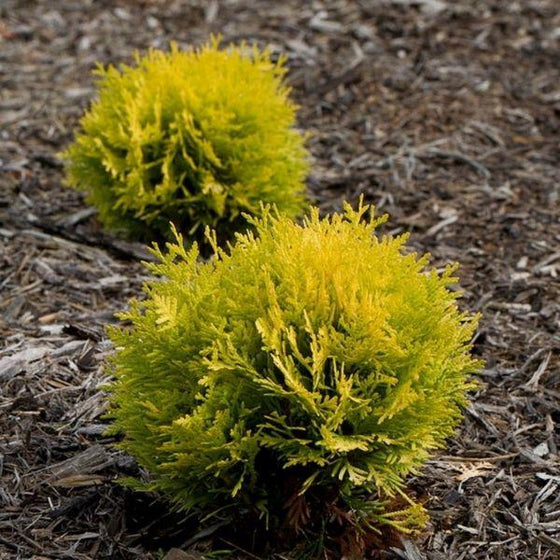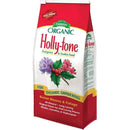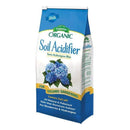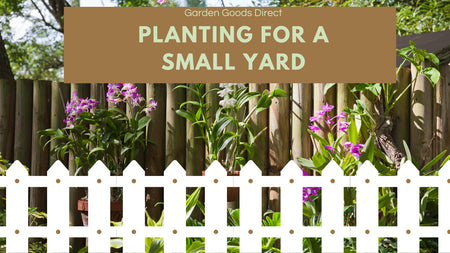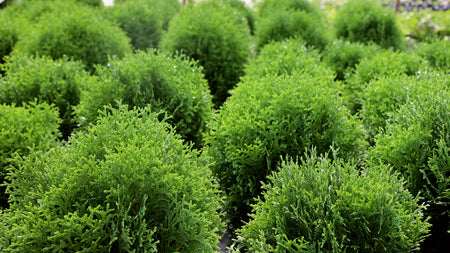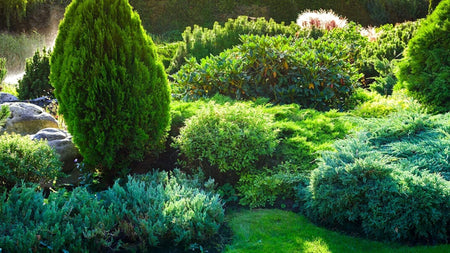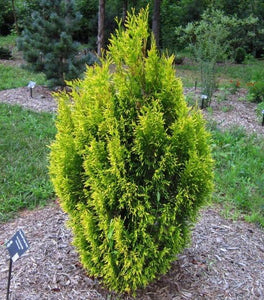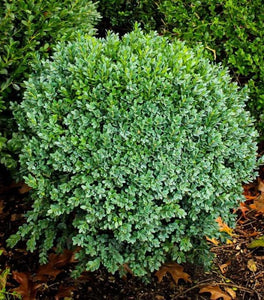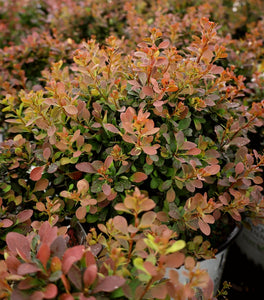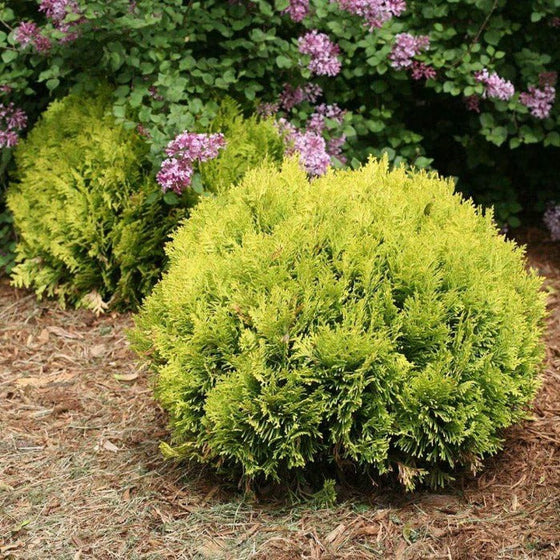
Images Depict Mature Plants
Anna's Magic Ball Arborvitae Shrubs for Sale Online
Anna's Magic Ball Arborvitae is a compact, globe-shaped evergreen with bright chartreuse foliage. Excellent resistance to burning in the full sun. Excellent small shrub for containers or smaller landscapes. Plant Anna's Magic Ball Arborvitae in groups to add a splash of color to the landscape.
- North American native.
- It does not need any pruning to maintain its shape.
- Bright yellow foliage adds year-round interest.
- Prefers well-drained soils.
- Dwarf Arborvitae
It was developed in Canada, so you know that this little plant isn't bothered by winter weather and holds its color all year round. This little native evergreen needs no pruning to keep its tight, rounded shape and makes a nice addition to perennial beds, rock gardens, troughs, containers, or any landscape project. Its petite size and well-behaved manner make it an especially nice choice for smaller yards and gardens.
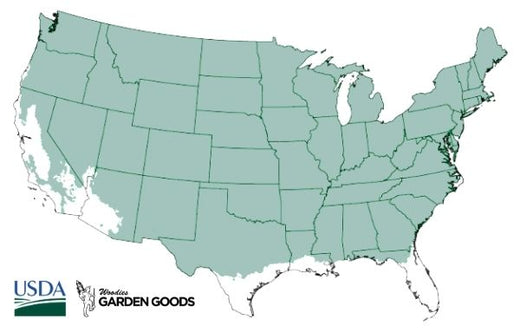
| Hardiness Zone: | 3-8 |
|---|---|
| Mature Height: | 1 to 1.5 Feet |
| Mature width: | 1 to 1.5 Feet |
| Classification: | Evergreen shrub |
| Sunlight: | Full sun |
| Habit: | Densely branched, mounding |
| Foliage: | Bright gold |
| Pruning Season: | Prune in late spring to maintain shape |
| Flower color: | None |
| Soil Condition: | Any well drained soil |
| Water Requirements: | Water well until established |
| Uses: | Extremely attractive when used as in the mixed border, foundations, or planted in mass |
How to Care for Anna's Magic Ball® Arborvitae
Be sure to read about the recommended care instructions to keep this plant healthy and thriving for years to come!
How do I plant a Magic Ball Arborvitae?
We suggest when planting your newly purchased Anna's Magic Ball Arborvitae Shrubs that you dig a hole twice as wide as the root system but not deeper. Depending on the quality of your existing soil you may need to add a locally sourced compost or topsoil to the back-fill soil. We do not recommend using straight topsoil or compost as a back-fill soil because more times than not these products will retain entirely to much moisture and will cause the root system to rot. Adding compost or topsoil will help the young feeder roots of Anna's Magic Ball Arborvitae Shrubs to spread through the loose, nutrient rich soil, much easier than if you used solely the existing soil which more times than not will be hard and compacted. The most common cause of plant death after transplanting is planting the new plant to deep. That is why we do not recommend planting in a hole any deeper than the soil line of the plant in the pot. A good rules is that you should still be able to see the soil the plant was grown in after back-filling the hole.
How do I water Anna's Magic Ball Arborvitae Shrubs?
After back filling and lightly compacting the 50/50 mix of existing soil and compost give the Anna's Magic Ball Arborvitae Shrubs a good deep watering. This is not to be rushed. Most of the water you put on the plant at first will run away from the plant until the soil is soaked. A general rule of thumb is to count to 5 for every one gallon of pot size. For example a one gallon pot would be watered until you count to 5 a three gallon pot would be 15 and so on. Check the plant daily for the first week or so and then every other day there after. Water using the counting method for the first few weeks. You’ll want to water the bushes regularly after planting until they’ve been well established. We like to tell folks that when watering Anna's Magic Ball Arborvitae or any plant for that matter its best not to water the foliage of the plant. Water at the base of the plant near the soil line only. Gator bag Jr. can be used to help aid in this process and also provide plants with a good soaking due to the slow release of the water into the root-zone of the plant. Soaker Hoses can also be used to water when planting a long hedge.
How do I fertilize Anna's Magic Ball Arborvitae Shrubs?
Plants such as Anna's Magic Ball Arborvitae Shrubs grow best if they are fertilized once in the spring and again in early summer. Anna's Magic Ball Arborvitae favors nutrient rich soil and ample fertilization. Anna's Magic Ball Arborvitae Shrubs benefits from an fertilizer which can help raise the acid level of the soil such as Holly-Tone by Espoma. When selecting a fertilizer for your Anna's Magic Ball Arborvitae, if soil Ph is not an issue a simple balanced fertilizer can be used such as Tree-tone. Either chemical fertilizers or organic matter can be used successfully. Since an organic method of applying manure and/or compost around the roots, produces excellent results and also improves the condition of the soil, this would be an excellent first line of attack. Organic additions to the soil can also be combined with a shot of chemical fertilizer for maximum effect. If you choose to use chemical fertilizers on your Anna's Magic Ball Arborvitae, applying a slow-release, balanced fertilizer once a year in the spring is probably the simplest solution.
How do I mulch Anna's Magic Ball Arborvitae Shrubs?
We highly recommend that you mulch your Anna's Magic Ball Arborvitae Shrubs with either a ground hardwood mulch or a ground cypress mulch depending on your local availability. Any type of mulch will do but cypress or hardwood mulch will be of a higher quality and provide better nutrition overall as they breakdown. Mulching helps to keep weeds away which will compete with your new investment for water and nutrients. A 2 to 3 inch layer of mulch is sufficient but remember to take care not to cover any part of the stem of the plant with mulch. Its better to leave a one inch gap of space between the mulch and the stem or trunk of the plant.

